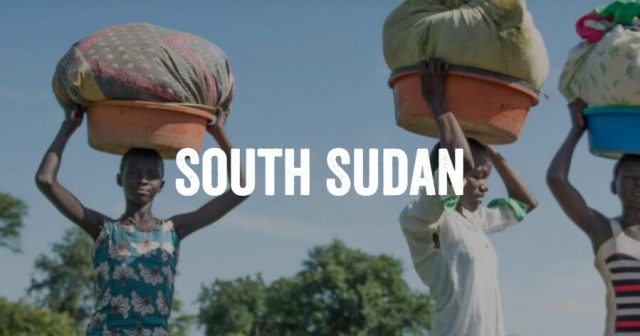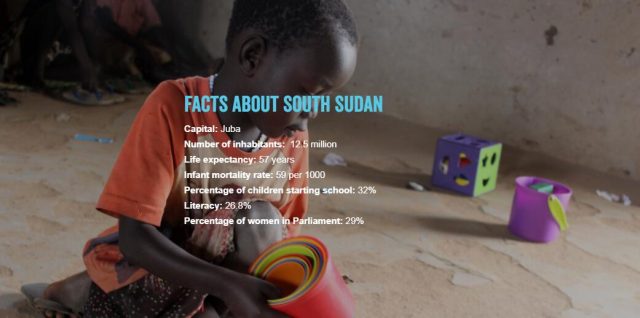South Sudan is the world’s youngest nation after independence from Sudan in 2011. But new conflicts broke out in the country just a couple of years after the peace and several million people have been forced to flee their homes. Due to conflicts and poverty, many children have been exposed to human rights violations and girls are particularly vulnerable to child marriage.
South Sudan is one of the poorest countries in the world. The economy is completely dependent on oil and aid and during the civil war the country’s development stopped. The war has forced millions of people to flee and more than 7 million people now need humanitarian aid. People have had their lives ruined and the children are worst affected.
Half of the population lacks secure access to food and a third of children under the age of five are malnourished. Among other things, this leads to them not growing as they should. At the same time, maternal mortality is high: almost 1 in 100 mothers dies when they give birth.
Another major challenge is education. Only just over a third of the children start primary school and less than a third can read and write.
Teenage girls in crisis
In crises and conflicts, children are hardest hit and girls are particularly vulnerable. The UN estimates that around 100,000 children have been exploited and exposed to human rights violations. The poor conditions in the country, such as deteriorating finances and food shortages, lead to families marrying off their daughters. Every second girl in South Sudan is forced to marry before she turns 18.
In a report from Plan International, teenage girls talk about the disaster the conflict has been for their lives. A majority of girls live in a constant fear of physical and sexual violence and three out of four suffer from depression and trauma after being subjected to violence and abuse, or because they have lost a loved one. Many girls have left school to start work, or because they have been forced to marry.
This is what Plan International does in South Sudan
To reduce the number of child marriages, we work to get more girls educated. Child marriage involves many risks and girls are deprived of the right to decide over their own lives and bodies. To make schools a safer place, we train teachers in dealing with child rights issues. Plan International also ensures that children are educated in child-friendly places, places where they feel safe. They get to learn what rights they have. A large part of our programs is also about ensuring that there is food in vulnerable areas. Among other things, we have made sure that families get seeds and tools so that they can grow their own food, but we also make sure that the children who go to school get school lunch. By giving students a meal, more people can continue to go to school while having the energy to learn more.
Another major focus in our on-site work in South Sudan is to ensure that more families can support themselves. We do this, among other things, by improving their opportunities for sustainable agriculture. In addition, we give young people vocational training so that they can get as good a start in life as possible.
School meals give children the opportunity to stay in school
South Sudan is the country in the world with the highest proportion of children who do not go to school, two reasons are conflicts and economic crisis. At the same time, an ongoing food crisis means that many children do not have enough energy for their studies. To get more children back to the classroom, Plan International offers children one meal of hot food a day.
Education is crucial for the children’s future. Therefore, in August 2017, Plan International started a school lunch program that gives school children one meal a day, to prevent more people from dropping out of school.
“Sometimes school meals are the only meal these children get in a day,” says Hillary Garrison, who works with administration in an elementary school.
For 17-year-old Josephine, school lunch is important to cope with the school day.
– When you are hungry, it is difficult to concentrate on the lessons and you are tired all the time, she says.
Josephine started school two years ago. Before she was offered school meals, she says she was always hungry.
– Sometimes we have no food at home and it happened that I even had to go home earlier from school because I was too tired, she says.
Even when there was food at home, it was difficult for Josephine to go home and have lunch because she lives more than an hour’s walk from school. Now that she has food there, she does not have to go the long way home for lunch and then back again for the afternoon lessons. It also gives her more time to study.
– I look forward to finishing primary school at the end of the year so that I can start high school. I want to become a doctor!
Since Plan International started the school lunch program, more students have been enrolled in schools and fewer have dropped out.
Strengthen young people’s financial opportunities
My husband, who is an elementary school teacher, no longer has to struggle to support our family because we are now adding up our two incomes. In the past, I was dependent on him for everything and it began to be difficult for us to survive with the ever-increasing food prices. Sometimes we could be without food for days because his salary was not always paid on time
Grace Anyou, 27, mother of four children and newly trained seamstress. Plan International offers young people vocational training so that they can support themselves. So far, we have trained 870 people in various professions and most of them have since gotten jobs or started companies.
Children’s right to security and protection
All my crops are growing. Now I have enough food for my family and can sell both vegetables and fruit to other families and restaurants nearby
Ismail Jacob, farmer in Kapotea East in eastern South Sudan. He was one of nearly five million people who for a long time did not have enough food to give to his family as a result of the ongoing famine. Plan International is currently conducting a collaborative project with the UN to provide families with seeds and agricultural implements so that the families can cope with the crisis. To date, we have supported 17,500 households.
Facts about South Sudan
Capital: Juba
Number of inhabitants: 12.5 million
Life expectancy: 57 years
Infant mortality rate: 59 per 1000
Percentage of children starting school: 32%
Literacy: 26.8%
Percentage of women in Parliament: 29%




